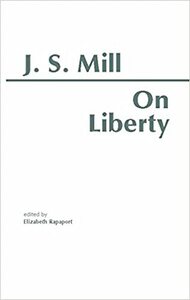Take a photo of a barcode or cover
informative
inspiring
reflective
slow-paced
reflective
medium-paced
challenging
informative
medium-paced
Kanske mer relevant i viktorianska London än i postmoderna Stockholm
challenging
informative
inspiring
reflective
slow-paced
challenging
informative
reflective
medium-paced
Unsure how to rate and review a philosophy book because its purpose is less to be a cohesive narration, but a source of thought and ideals. I think it’s also possible that general principles can be interpreted to further one’s point of view in a selective/reinforcing bias way. Reminded me a lot of philosophytube’s “was Nietzsche woke/MAGA?” because what can be interpreted as the freedom to let trans people be and exist and express individuality can also be interpreted as MAGA talking points in serving a greater cause/country & Mill makes similar points. Philosophy can be of its time often but I think it’s important to also study context and understand how it can be transposed to today…
I was surprised at his love for his wife (and defence of women as a whole) and his points about white supremacy (especially in the US) because I’m used to old time-y men being irredeemable douchebags, but the one big thing I’ve noticed is that he doesn’t really see children as people (and by extension, people “who act like children” which can turn eugenistic really quick). Other points are that he’s very libertarian, militating for small government (but also some form of socialist/democratic rule of the local people?); utilitarianism can be quite problematic when it turns to people who aren’t “useful” or actions that are inexcusable but lead to a “good” for the majority; he really defends all opinions equally which reminds me of the paradox of tolerance (which only got coined almost 100 years later by karl popper) and reminded me of this tiktok that said “you don’t bring crack to sell at the farmer’s market”; he is VERY critical of religion and its teachings towards accepting dogmas without questioning. Building on the last point, he mentions also how (paraphrasing) “society has spent countless efforts to coerce people to both socially and individually follow what it deemed normal/perfect” and to that I related the patriarchy and the conformation to gender roles and how it is an active campaign to keep patriarchy in place because it’s not natural, but it is the result of constant coercion of all its participants…
overall I quite enjoyed reading this, maybe will read more philosophy in the future (picked this up because my mom got it for me as a christmas gift).
As a result of Covid I have been thinking more about where the line of advocating for individual liberty versus societal good should be drawn (although Mill would probably say that one leads to the other and they are not on conflict with each other). Determining when government and society should discourage opinions or prohibit actions is very much up for debate whether it's banning Big Gulps, the influence of social media, Covid measures, or "cancel culture".
Mill argues that the only time government or society should punish opinions or actions is if it causes direct harm to others.*
*Mill puts a large and terrible qualifier on this. His rule of thumb does not apply to what he considers to be "backwards states" or "barbarians". Basically it's ok to colonize and decide what is good for African people. European people though are considered mature enough to be trusted to pursue their own individual good
Mill argues that the only time government or society should punish opinions or actions is if it causes direct harm to others.*
*Mill puts a large and terrible qualifier on this. His rule of thumb does not apply to what he considers to be "backwards states" or "barbarians". Basically it's ok to colonize and decide what is good for African people. European people though are considered mature enough to be trusted to pursue their own individual good
Social Liberty (Mill) vs. Economic Liberty (Mill & Classical Liberals)
In On Liberty, John Stuart Mill primarily focuses on social liberty, emphasizing the importance of individual freedom, free speech, and protection against tyranny (both from the state and societal norms). His famous "Harm Principle" asserts that individuals should be free to act as they wish unless their actions harm others.
However, economic liberty—which is more aligned with classical liberalism’s free-market ideals—is a different dimension of his thought. This is where Raworth, Mazzucato, and myself, would have critiques, as our work challenges the idea of minimal government and laissez-faire economics.
Social liberty: On the need for protecting individuals from oppressive power structures, be it the state or societal norms. Needless to say, this should be the foundational core of every society, indeed.
Economic liberty: Here, Mill leans more toward classical liberalism, supporting free markets and limited government intervention—which Raworth, Mazzucato, and myself would oppose with our work and critiques of contemporary capitalism.
In On Liberty, John Stuart Mill primarily focuses on social liberty, emphasizing the importance of individual freedom, free speech, and protection against tyranny (both from the state and societal norms). His famous "Harm Principle" asserts that individuals should be free to act as they wish unless their actions harm others.
However, economic liberty—which is more aligned with classical liberalism’s free-market ideals—is a different dimension of his thought. This is where Raworth, Mazzucato, and myself, would have critiques, as our work challenges the idea of minimal government and laissez-faire economics.
Social liberty: On the need for protecting individuals from oppressive power structures, be it the state or societal norms. Needless to say, this should be the foundational core of every society, indeed.
Economic liberty: Here, Mill leans more toward classical liberalism, supporting free markets and limited government intervention—which Raworth, Mazzucato, and myself would oppose with our work and critiques of contemporary capitalism.
challenging
informative
slow-paced
Had it pitched as ‘the best book ever written about politics’ and it’s not far off. Nuance about the welfare state was unexpected but not unwelcome.



